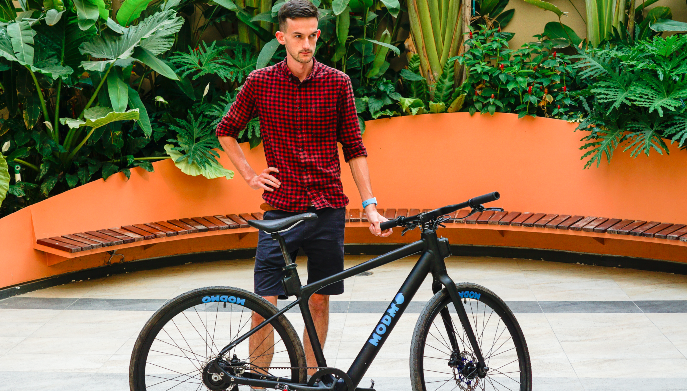
A ‘lifelong cyclist’, he always believed cycling is the best way to get from point A to point B. At the age of 13, he started racing downhill mountain bikes nationally.
Three years later, Jack O’Sullivan decided to convert his passion into a business and founded Vital Fixes, a direct-to-consumer brand of single-speed bikes, in Dublin.
While running the business, he realised bike commuters faced three common pain points: sweating, theft, and utility. To address these pain points, he developed the concept of a bike in 2019 that can replace cars for urban transportation with three main features: electric, modular and smart.
And Modmo took birth.
“There were no bike manufacturers in Ireland, so I travelled to China and Taiwan to find the finest bicycle factory,” O’Sullivan tells e27. “However, I couldn’t find any and so decided to take a spur-of-the-moment trip to Vietnam in 2019 where I met with some bike manufacturers.”
Also Read: Why 2020 is the year for tech startups in Vietnam
It was a turning point in his life.
In the Southeast Asian country, he joined Vietnam Silicon Valley (VSV) Accelerator and Becamex Business Incubator. This where he built a team of engineers, who turned 3D designs into a manufacturable product within eight months.
Designed to replace cars, Saigon –as his bike brand is known — is the “first fully modular bicycle”, he claims. The product is expected to hit the market in June.
Saigon has an 18.5Ah battery, which allows up to 200km of pedal-assisted cycling per charge. Plus, the bike uses a fully-integrated and removable battery, paired with a front 250-watt motor to get you from A to B effortlessly and without a sweat. It weighs just 14kg.
Saigon is designed as a pedelec, meaning people wouldn’t need a license, pay tax or insurance to ride it on the streets.
“Simple on the outside but high-tech inside, Saigon has a smart handlebar display, GPS for location tracking and Bluetooth for function control via the iOS/Android app. The front and rear modular mounts allow our range of MODs (modular accessories) to easily slide on/off, allowing riders to customise it to use for other utility purposes. One can mount a child seat, basket, food delivery boxes and a pannier rack onto the bike,” he says as he explains the features of the two-wheeler.
While all the R&D activities are done in Vietnam, the company has no plans to sell the product in the country. “Majority of our customers come from the US. We are also receiving enquiries from countries such as Ireland, Germany, and the Netherlands,” he says.
Modmo also sees great potential in markets such as Taiwan, Japan and South Korea, but it has no immediate plans to enter these markets.
While it is priced at €2,799 (US$3,098), Saigon is available at a discounted price at €1,999 (US$2,212). One can pre-order by paying just €99 (US$110).
Also Read: Is Vietnam the new golden child of tech startups in SEA?
The less-than-a-year-old startup is backed by VSV and a few unnamed angel investors.
According to O’Sullivan, the company is already cashflow positive. “We’ve been growing 120 per cent per week since the launch. Also, we’ve had a close partnership with our manufacturer, so we’re able to do the final tooling payments after our Kickstarter campaign in June,” he reveals.
According to O’Sullivan, smart scooters currently available in the market such as Scooterson cannot be used for utilities. “Although these scooters are a great option for first- and last-mile transportation, they are not suitable for any other utilities. On the other hand, Saigon is modular and allows riders to carry much more. Also, Saigon comes with a much longer battery range. Plus, we’re about half the price,” he says.
Under quarantine

Modmo Founder Jack O’Sullivan
O’Sullivan was recently put in a quarantine centre in Ho Chi Minh City after he came into indirect contact with three people, who had tested positive for COVID-19. So he had to move my “office” to the centre.
“Instead of working from home, this will be my office for the next 14 days. We’ve got a 60mb internet speed, which is much faster than the one we have in our office. Food is delivered to our beds. I can still get things running. The bikes are still manufactured. The pandemic might actually have sped up production because people are on the edge and things could be shut down tomorrow,” he concludes.
The post Vietnam’s e-bike Saigon aims to replace cars for urban transportation appeared first on e27.